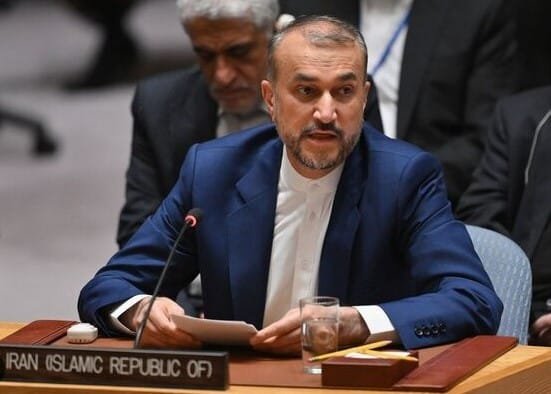The foreign minister of Iran declined to say on Friday that Israel was the cause of the most recent attack on his nation, comparing the weaponry to toys for kids.
In an interview with Tom Llamas of NBC News, Hossein Amirabdollahian, the foreign minister, stated, “What happened last night was not a strike.” “They weren’t drones; they were more like toys that our kids play with.”
In a diplomatic maneuver marked by cautious rhetoric, Iran’s Foreign Minister, Hossein Amirabdollahian, refrained from directly implicating Israel in the most recent attack on his nation. Speaking in an interview with Tom Llamas of NBC News, Amirabdollahian opted for measured language, describing the weaponry used in the attack as akin to “toys for kids,” while stopping short of assigning blame to any specific actor.
The incident in question, which occurred the previous night, has sparked speculation and heightened tensions in the region. However, rather than stoking the flames of accusation, Amirabdollahian’s remarks sought to temper the rhetoric surrounding the attack, characterizing it as something less than a deliberate strike. His choice of words, likening the weapons to children’s toys, serves as a deliberate attempt to downplay the severity of the incident and avoid escalating tensions further.
Amirabdollahian’s refusal to attribute blame directly to Israel reflects Iran’s broader approach to managing its relations with regional adversaries. Despite longstanding animosity and occasional flare-ups of violence between the two countries, Iran has often employed a strategy of cautious diplomacy, seeking to avoid outright confrontation while maintaining a posture of defiance against perceived threats to its sovereignty and security.
The foreign minister’s remarks come amidst a backdrop of escalating tensions in the Middle East, with Iran facing mounting pressure from regional rivals and international actors alike. Against this backdrop, his decision to refrain from directly accusing Israel of involvement in the attack underscores the complexity of Iran’s diplomatic calculus and its efforts to navigate a delicate geopolitical landscape fraught with peril.
Amirabdollahian’s characterization of the weapons used in the attack as “toys” serves multiple purposes. On one hand, it serves to downplay the significance of the incident, framing it as a relatively minor provocation rather than a serious act of aggression. By likening the weapons to children’s toys, he also subtly undermines the technological prowess and military capabilities of Iran’s adversaries, seeking to project an image of resilience and defiance in the face of external threats.
However, beneath the veneer of diplomatic language lies a deeper reality of geopolitical tensions and strategic calculations. While Iran may choose to downplay the severity of the recent attack for public consumption, behind the scenes, policymakers are likely engaged in a careful assessment of the situation and its potential implications for the country’s security and stability.
The decision to refrain from directly implicating Israel in the attack reflects Iran’s desire to avoid further escalating tensions with its regional adversaries. Despite the deep-seated enmity between the two countries, both sides are acutely aware of the risks inherent in open conflict, with the potential to unleash a spiral of violence and instability with far-reaching consequences for the entire region.
As Iran navigates the treacherous waters of regional geopolitics, its foreign minister’s cautious rhetoric underscores the delicate balance Tehran seeks to strike between projecting strength and avoiding unnecessary confrontation. By refraining from assigning blame directly to Israel, Iran aims to signal its willingness to engage in dialogue and diplomacy, even as it maintains a steadfast defense of its national interests and sovereignty.
In the coming days and weeks, the true implications of the recent attack and Iran’s response to it are likely to become clearer. However, Amirabdollahian’s remarks offer a glimpse into the intricate dynamics shaping Iran’s approach to regional security and its ongoing efforts to navigate a complex and unpredictable geopolitical landscape.
